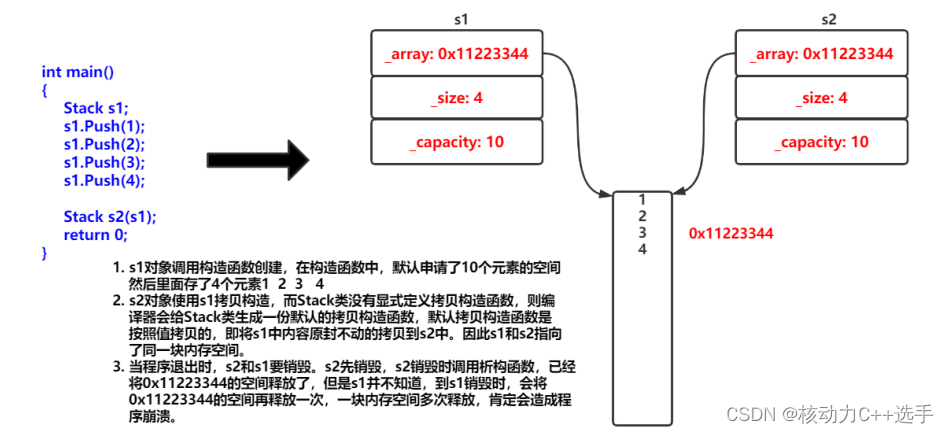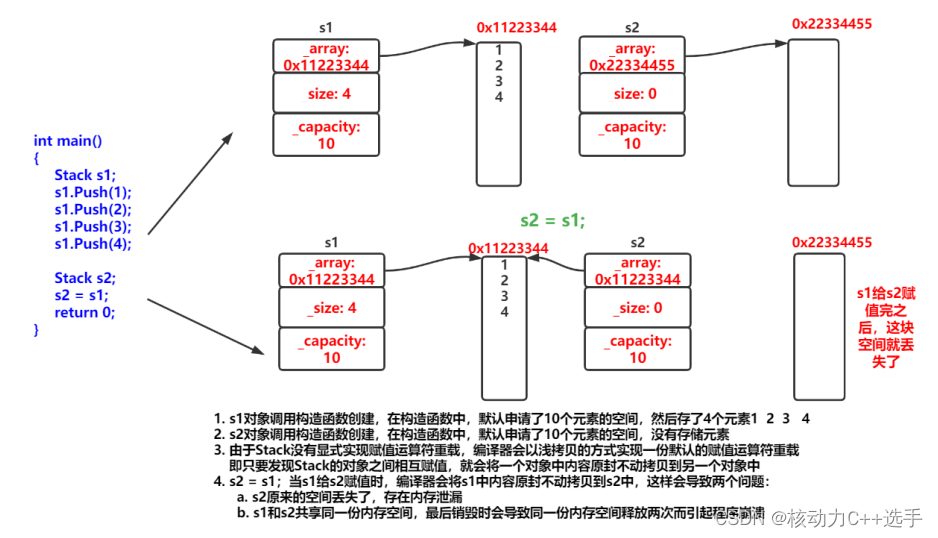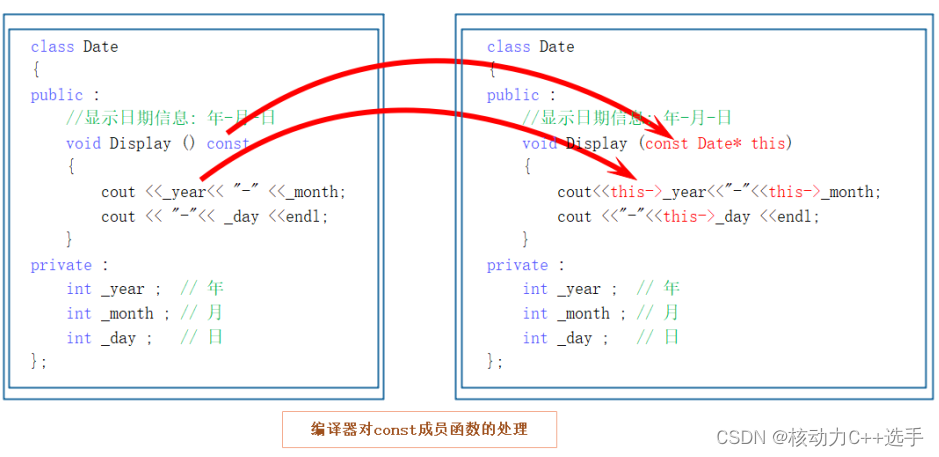【C++】类和对象(2)
这篇博客继续学习类和对象~,主要介绍了类的6个默认成员函数。
目录
类的6个默认成员函数
构造函数
概念
特性
析构函数
概念
特性
拷贝构造函数
特性
赋值运算符重载
运算符重载
赋值运算符重载
前置++和后置++重载
日期类的实现
const成员
取地址及const取地址操作符重载
类的6个默认成员函数
如果一个类中什么成员都没有,简称为空类。
空类中真的什么都没有吗?并不是,任何类在什么都不写时,编译器会自动生成以下6个默认成员
函数。
默认成员函数:用户没有显式实现,编译器会生成的成员函数称为默认成员函数。

构造函数
概念
对于Date类,
class Date
{
public:
void Init(int year, int month, int day)
{
_year = year;
_month = month;
_day = day;
}
void Print()
{
cout << this << endl;
cout << this->_year << '-' << _month << '-' << _day << endl;
}
private:
int _year;
int _month;
int _day;
};
int main()
{
Date d1;
d1.Init(2024, 1, 28);
d1.Print();
Date d2;
d2.Init(2024, 3, 15);
d2.Print();
return 0;
}在每次创建Date对象时,都要进行初始化Init,这未免有些麻烦,因此,在C++中,设计了构造函数,在每次创建对象时都能自动初始化对象,这样就会简单很多。
构造函数是一个特殊的成员函数,名字与类名相同,创建类类型对象时由编译器自动调用,以保证每个数据成员都有一个合适的初始值,并且在对象整个生命周期内只调用一次。
特性
构造函数是特殊的成员函数,需要注意的是,构造函数虽然名称叫构造,但是构造函数的主要任
务并不是开空间创建对象,而是初始化对象。
其特征如下:
1. 函数名与类名相同。
2. 无返回值。
3. 对象实例化时编译器自动调用对应的构造函数。
4. 构造函数可以重载。
class Date
{
public:
// 1.无参构造函数
Date()
{}
// 2.带参构造函数
Date(int year, int month, int day)
{
_year = year;
_month = month;
_day = day;
}
private:
int _year;
int _month;
int _day;
};
void TestDate()
{
Date d1; // 调用无参构造函数
Date d2(2015, 1, 1); // 调用带参的构造函数
// 注意:如果通过无参构造函数创建对象时,对象后面不用跟括号,否则就成了函数声明
// 以下会被认为函数声明:声明了d3函数,该函数无参,返回一个日期类型的对象
Date d3();
}5.如果类中没有显式定义构造函数,则C++编译器会自动生成一个无参的默认构造函数,一旦用户显式定义编译器将不再生成。
class Date
{
public:
/*
// 如果用户显式定义了构造函数,编译器将不再生成
Date(int year, int month, int day)
{
_year = year;
_month = month;
_day = day;
}
*/
void Print()
{
cout << _year << "-" << _month << "-" << _day << endl;
}
private:
int _year;
int _month;
int _day;
};
int main()
{
// 将Date类中构造函数屏蔽后,代码可以通过编译,因为编译器生成了一个无参的默认构造函
数
// 将Date类中构造函数放开,代码编译失败,因为一旦显式定义任何构造函数,编译器将不再
生成
// 无参构造函数,放开后报错:error C2512: “Date”: 没有合适的默认构造函数可用
Date d1;
return 0;
}6.关于编译器生成的默认成员函数,很多童鞋会有疑惑:不实现构造函数的情况下,编译器会
生成默认的构造函数。但是看起来默认构造函数又没什么用?d对象调用了编译器生成的默
认构造函数,但是d对象_year/_month/_day,依旧是随机值。也就说在这里编译器生成的
默认构造函数并没有什么用??
答:C++把类型分成内置类型(基本类型)和自定义类型。内置类型就是语言提供的数据类型,如:int/char...,自定义类型就是我们使用class/struct/union等自己定义的类型,看看下面的程序,就会发现编译器生成默认的构造函数会对自定类型成员_t调用的它的默认成员函数。
class Time
{
public:
Time()
{
cout << "Time()" << endl;
_hour = 0;
_minute = 0;
_second = 0;
}
private:
int _hour;
int _minute;
int _second;
};
class Date
{
private:
// 基本类型(内置类型)
int _year;
int _month;
int _day;
// 自定义类型
Time _t;
};
int main()
{
Date d;
return 0;
}注意:C++11 中针对内置类型成员不初始化的缺陷,又打了补丁,即:内置类型成员变量在
类中声明时可以给默认值。
class Time
{
public:
Time()
{
cout << "Time()" << endl;
_hour = 0;
_minute = 0;
_second = 0;
}
private:
int _hour;
int _minute;
int _second;
};
class Date
{
private:
// 基本类型(内置类型)
int _year = 1970;
int _month = 1;
int _day = 1;
// 自定义类型
Time _t;
};
int main()
{
Date d;
return 0;
}7.无参的构造函数和全缺省的构造函数都称为默认构造函数,并且默认构造函数只能有一个。
注意:无参构造函数、全缺省构造函数、我们没写编译器默认生成的构造函数,都可以认为是默认构造函数。
class Date
{
public:
Date()
{
_year = 1900;
_month = 1;
_day = 1;
}
Date(int year = 1900, int month = 1, int day = 1)
{
_year = year;
_month = month;
_day = day;
}
private:
int _year;
int _month;
int _day;
};
// 以下测试函数能通过编译吗?
void Test()
{
Date d1;
}不能通过测试。因为不知道调用无参的构造函数还是全缺省的构造函数。
建议:只提供全缺省的构造函数。绝大多数场景下面都需要自己实现构造函数。
析构函数
概念
析构函数:与构造函数功能相反,析构函数不是完成对对象本身的销毁,局部对象销毁工作是由
编译器完成的。而对象在销毁时会自动调用析构函数,完成对象中资源的清理工作。
特性
析构函数是特殊的成员函数,其特征如下:
1. 析构函数名是在类名前加上字符 ~
2. 无参数无返回值类型。
3. 一个类只能有一个析构函数。若未显式定义,系统会自动生成默认的析构函数。注意:析构函数不能重载
4. 对象生命周期结束时,C++编译系统系统自动调用析构函数
typedef int DataType;
class Stack
{
public:
Stack(size_t capacity = 3)
{
_array = (DataType*)malloc(sizeof(DataType) * capacity);
if (NULL == _array)
{
perror("malloc申请空间失败!!!");
return;
}
_capacity = capacity;
_size = 0;
}
void Push(DataType data)
{
// CheckCapacity();
_array[_size] = data;
_size++;
}
// 其他方法...
~Stack()
{
if (_array)
{
free(_array);
_array = NULL;
_capacity = 0;
_size = 0;
}
}
private:
DataType* _array;
int _capacity;
int _size;
};
void TestStack()
{
Stack s;
s.Push(1);
s.Push(2);
}析构函数的调用顺序
局部对象(先定义的后析构)->局部的静态->全局对象(先定义的后析构)
5. 编译器生成的默认析构函数和构造函数类似,对内置类型不做处理,对自定类型成员调用它的析构函数。
#include <iostream>
using namespace std;
class Time
{
public:
~Time()
{
cout << "~Time()" << endl;
}
private:
int _hour;
int _minute;
int _second;
};
class Date
{
private:
// 基本类型(内置类型)
int _year = 1970;
int _month = 1;
int _day = 1;
// 自定义类型
Time _t;
};
int main()
{
Date d;
return 0;
}运行上面的程序,会输出“~Time()”字符串,也就是调用了Time类的析构函数,但是在main函数中只是创建了Date对象,并没有创建Time对象,为什么会调用Time类的析构函数呢?原因就在于,创建的Date类对象中,成员有_year、_month、_day这个三个内置类型,还有_t这个自定义类型,内置类型销毁时不需要资源清理,最后系统会将其内存直接收回,而自定义类型需要调用其析构函数。
拷贝构造函数
用已存在的类类型对象创建新对象,完成已存在对象的拷贝,由编译器自动调用。
特性
拷贝构造函数也是特殊的成员函数,其特征如下:
1.拷贝构造函数是构造函数的一个重载形式。
2.拷贝构造函数的参数只有一个且必须是类类型对象的引用,使用传值方式编译器直接报错,因为会引发无穷递归调用。
class Date
{
public:
Date(int year = 1900, int month = 1, int day = 1)
{
_year = year;
_month = month;
_day = day;
}
// Date(const Date d) // 错误写法:编译报错,会引发无穷递归
//Date(const Date& d) // 正确写法
//{
// _year = d._year;
// _month = d._month;
// _day = d._day;
//}
Date(const Date& d)
{
_year = d._year;
_month = d._month;
_day = d._day;
}
private:
int _year;
int _month;
int _day;
};
int main()
{
Date d1;
Date d2(d1);
Date d3(d2);
return 0;
}
3. 若未显式定义,编译器会生成默认的拷贝构造函数。 默认的拷贝构造函数对象按内存存储按字节序完成拷贝,这种拷贝叫做浅拷贝,或者值拷贝。
class Date
{
public:
Date(int year = 1900, int month = 1, int day = 1)
{
_year = year;
_month = month;
_day = day;
}
private:
int _year;
int _month;
int _day;
};
int main()
{
Date d1;
// 用已经存在的d1拷贝构造d2,此处会调用Date类的拷贝构造函数
// 但Date类并没有显式定义拷贝构造函数,则编译器会给Date类生成一个默认的拷贝构
// 造函数
Date d2(d1);
Date d3(d2);
return 0;
}注意:在编译器生成的默认拷贝构造函数中,内置类型是按照字节方式直接拷贝的,而自定
义类型是调用其拷贝构造函数完成拷贝的。
4. 编译器生成的默认拷贝构造函数已经可以完成字节序的值拷贝了,还需要自己显式实现吗?当然像日期类这样的类是没必要的。但是下面这个类会涉及到动态内存开辟,就会有问题。
typedef int DataType;
class Stack
{
public:
Stack(size_t capacity = 10)
{
_array = (DataType*)malloc(capacity * sizeof(DataType));
if (nullptr == _array)
{
perror("malloc申请空间失败");
return;
}
_size = 0;
_capacity = capacity;
}
void Push(const DataType& data)
{
// CheckCapacity();
_array[_size] = data;
_size++;
}
~Stack()
{
if (_array)
{
free(_array);
_array = nullptr;
_capacity = 0;
_size = 0;
}
}
private:
DataType* _array;
size_t _size;
size_t _capacity;
};
int main()
{
Stack s1;
s1.Push(1);
s1.Push(2);
s1.Push(3);
s1.Push(4);
Stack s2(s1);
return 0;
}
注意:类中如果没有涉及资源申请时,拷贝构造函数是否写都可以;一旦涉及到资源申请时,则拷贝构造函数是一定要写的,否则就是浅拷贝。
赋值运算符重载
运算符重载
C++为了增强代码的可读性引入了运算符重载,运算符重载是具有特殊函数名的函数,也具有其
返回值类型,函数名字以及参数列表,其返回值类型与参数列表与普通的函数类似。
函数名字为:关键字operator后面接需要重载的运算符符号。
函数原型:返回值类型 operator操作符(参数列表)
注意:
1.不能通过连接其他符号来创建新的操作符:比如operator@
2.重载操作符必须有一个类类型参数
3.用于内置类型的运算符,其含义不能改变,例如:内置的整型+,不 能改变其含义
4.作为类成员函数重载时,其形参看起来比操作数数目少1,因为成员函数的第一个参数为隐藏的this
5. .* :: sizeof ?: . 注意以上5个运算符不能重载。这个经常在笔试选择题中出现。
下面封装了一个Date类,对‘<’进行了重载:
class Date
{
public:
Date(int year = 1, int month = 1, int day = 1)
{
_year = year;
_month = month;
_day = day;
}
// d1 < d2
bool operator<(const Date& d)
{
if (_year < d._year)
{
return true;
}
else if (_year == d._year)
{
if (_month < d._month)
{
return true;
}
else if(_month == d._month)
{
return _day < d._month;
}
}
return true;
}
void Print()
{
cout << _year << '/' << _month << '/' << _day << endl;
}
private:
int _year;
int _month;
int _day;
};赋值运算符重载
1.赋值运算符重载格式.
1)参数类型:const T&,传递引用可以提高传参效率
2)返回值类型:T&,返回引用可以提高返回的效率,有返回值目的是为了支持连续赋值
3)检测是否自己给自己赋值
4)返回*this :要复合连续赋值的含义
class Date
{
public:
Date(int year = 1, int month = 1, int day = 1)
{
_year = year;
_month = month;
_day = day;
}
Date& operator=(const Date& d)
{
//d1 = d2
//d1 = d1
if (this != &d)//防止自己给自己赋值
{
_year = d._year;
_month = d._month;
_day = d._day;
}
return *this;//连续赋值
}
void Print()
{
cout << _year << '/' << _month << '/' << _day << endl;
}
private:
int _year;
int _month;
int _day;
};2. 赋值运算符只能重载成类的成员函数不能重载成全局函数
原因:赋值运算符如果不显式实现,编译器会生成一个默认的。此时用户再在类外自己实现
一个全局的赋值运算符重载,就和编译器在类中生成的默认赋值运算符重载冲突了,故赋值
运算符重载只能是类的成员函数。

3.用户没有显式实现时,编译器会生成一个默认赋值运算符重载,以值的方式逐字节拷贝。注
意:内置类型成员变量是直接赋值的,而自定义类型成员变量需要调用对应类的赋值运算符
重载完成赋值。
既然编译器生成的默认赋值运算符重载函数已经可以完成字节序的值拷贝了,还需要自己实现吗?当然像日期类这样的类是没必要的。那么下面的类呢?验证一下试试?
typedef int DataType;
class Stack
{
public:
Stack(int capacity=10)
{
DataType* tmp=(DataType*)malloc(sizeof(DataType) * capacity);
if (tmp == nullptr)
{
perror("malloc fail");
exit(-1);
}
_array = tmp;
_size = 0;
_capacity = capacity;
}
void Push(DataType x)
{
_array[_size++] = x;
}
~Stack()
{
if (_array)
{
free(_array);
_array = nullptr;
_size = _capacity = 0;
}
}
private:
DataType* _array;
int _size;
int _capacity;
};
int main()
{
Stack s1;
s1.Push(1);
s1.Push(2);
Stack s2;
s2 = s1;
return 0;
}会发生报错!原因就在于赋值拷贝时完成的是浅拷贝,程序退出时,会调用析构函数释放同一块儿空间,会引起崩溃;另外,由于赋值拷贝,s2原来的空间丢失了,造成内存泄漏。

注意:如果类中未涉及到资源管理,赋值运算符是否实现都可以;一旦涉及到资源管理则必
须要实现。
前置++和后置++重载
class Date
{
public:
Date(int year = 1900, int month = 1, int day = 1)
{
_year = year;
_month = month;
_day = day;
}
// 前置++:返回+1之后的结果
// 注意:this指向的对象函数结束后不会销毁,故以引用方式返回提高效率
Date& operator++()
{
_day += 1;
return *this;
}
// 后置++:
// 前置++和后置++都是一元运算符,为了让前置++与后置++形成能正确重载
// C++规定:后置++重载时多增加一个int类型的参数,但调用函数时该参数不用传递,编译器
自动传递
// 注意:后置++是先使用后+1,因此需要返回+1之前的旧值,故需在实现时需要先将this保存
一份,然后给this + 1
// 而temp是临时对象,因此只能以值的方式返回,不能返回引用
Date operator++(int)
{
Date temp(*this);
_day += 1;
return temp;
}
private:
int _year;
int _month;
int _day;
};
int main()
{
Date d;
Date d1(2022, 1, 13);
d = d1++; // d: 2022,1,13 d1:2022,1,14
d = ++d1; // d: 2022,1,15 d1:2022,1,15
return 0;
}日期类的实现
日期类的实现我们采用声明与定义分离,在Date.h中声明,在Date.cpp中定义:
Date.h
class Date
{
public:
//全缺省的构造函数
Date(int year = 1, int month = 1, int day = 1);
// d1 < d2
bool operator<(const Date& d);
bool operator<=(const Date& d);
bool operator>(const Date& d);
bool operator>=(const Date& d);
bool operator==(const Date& d);
bool operator!=(const Date& d);
//获取某年某月的天数
int GetMonthDay(int year, int month)
{
assert(month > 0 && month < 13);
static int MonthDay[13] = { 0,31,28,31,30,31,30,31,31,30,31,30,31 };
// 1 2 3 4 5 6 7 8 9 10 11 12
if (month == 2 && (year % 4 == 0 && year % 400 != 0) || (year % 400 == 0))
{
return 29;
}
return MonthDay[month];
}
//日期+=天数
Date& operator+=(int day);
//日期+天数
Date operator+(int day);
//日期-=天数
Date& operator-=(int day);
//日期-天数
Date operator-(int day);
//++d1
Date& operator++();
//特殊处理:解决语法逻辑不自洽,自相矛盾的问题
//d1++
//为了跟前置++区分,强行增加一个int形参,构成重载区分
Date operator++(int);
//--d1
Date& operator--();
//d1--
//为了跟前置--区分,强行增加一个int形参,构成重载区分
Date operator--(int);
//日期减日期
int operator-(const Date& d);
void Print()
{
cout << _year << '/' << _month << '/' << _day << endl;
}
private:
int _year;
int _month;
int _day;
};Date.cpp
Date::Date(int year, int month, int day)
{
_year = year;
_month = month;
_day = day;
}
bool Date::operator<(const Date& d)
{
if (_year < d._year)
{
return true;
}
else if (_year == d._year)
{
if (_month < d._month)
{
return true;
}
else if(_month == d._month)
{
return _day < d._month;
}
}
return false;
}
bool Date::operator==(const Date& d)
{
return _year == d._year
&& _month == d._month
&& _day == d._day;
}
bool Date::operator<=(const Date& d)
{
return *this < d || *this == d;
}
bool Date::operator>(const Date& d)
{
return !(*this <= d);
}
bool Date::operator>=(const Date& d)
{
return !(*this < d);
}
bool Date::operator!=(const Date& d)
{
return !(*this == d);
}
Date Date::operator+(int day)
{
//Date tmp(*this);
Date tmp = *this;//也是拷贝构造
tmp._day = tmp._day + day;
while (tmp._day > GetMonthDay(tmp._year, tmp._month))
{
tmp._day = tmp._day - GetMonthDay(tmp._year, tmp._month);
tmp._month++;
if (tmp._month == 13)
{
tmp._month = 1;
tmp._year++;
}
}
return tmp;
}
Date& Date::operator+=(int day)
{
*this = *this + day;
return *this;
}
Date& Date::operator-=(int day)
{
_day -= day;
while (_day <= 0)
{
_month--;
if (_month == 0)
{
_year--;
_month = 12;
}
_day += GetMonthDay(_year, _month);
}
return *this;
}
Date Date::operator-(int day)
{
Date tmp = *this;
tmp -= day;
return tmp;
}
//前置++
Date& Date::operator++()
{
*this += 1;
return *this;
}
//后置++
Date Date::operator++(int)
{
Date tmp = *this;
*this += 1;
return tmp;
}
//前置--
Date& Date::operator--()
{
*this -= 1;
return *this;
}
//后置--
Date Date::operator--(int)
{
Date tmp = *this;
*this -= 1;
return tmp;
}
int Date::operator-(const Date& d)
{
int flag = 1;
int count = 0;
Date max = *this;
Date min = d;
if (max < min)
{
flag = -1;
max = d;
min = *this;
}
while (min != max)
{
min++;
count++;
}
return flag*count;
}const成员
将const修饰的“成员函数”称之为const成员函数,const修饰类成员函数,实际修饰该成员函数隐含的this指针,表明在该成员函数中不能对类的任何成员进行修改。

我们可以给前述Date类成员函数加上const修饰:
class Date
{
public:
bool CheckInvalid()const;
//全缺省的构造函数
Date(int year = 1, int month = 1, int day = 1);
// d1 < d2
bool operator<(const Date& d) const;
bool operator<=(const Date& d) const;
bool operator>(const Date& d) const;
bool operator>=(const Date& d)const;
bool operator==(const Date& d)const;
bool operator!=(const Date& d)const;
//获取某年某月的天数
int GetMonthDay(int year, int month)const
{
assert(month > 0 && month < 13);
static int MonthDay[13] = { 0,31,28,31,30,31,30,31,31,30,31,30,31 };
// 1 2 3 4 5 6 7 8 9 10 11 12
if (month == 2 && (year % 4 == 0 && year % 400 != 0) || (year % 400 == 0))
{
return 29;
}
return MonthDay[month];
}
//日期+=天数
Date& operator+=(int day);
//日期+天数
Date operator+(int day)const;
//日期-=天数
Date& operator-=(int day);
//日期-天数
Date operator-(int day)const;
//++d1
Date& operator++();
//特殊处理:解决语法逻辑不自洽,自相矛盾的问题
//d1++
//为了跟前置++区分,强行增加一个int形参,构成重载区分
Date operator++(int);
//--d1
Date& operator--();
//d1--
//为了跟前置--区分,强行增加一个int形参,构成重载区分
Date operator--(int);
//日期减日期
int operator-(const Date& d)const;
void Print() const
{
cout << _year << '/' << _month << '/' << _day << endl;
}
/*void operator<< (ostream& out)
{
out << _year << "年" << _month << "月" << _day << "日" << endl;
}*/
//友元声明
friend istream& operator>> (istream& in, Date& d);
friend ostream& operator<< (ostream& out, const Date& d);
private:
int _year;
int _month;
int _day;
};其中,以下几个成员函数不能加const修饰,因为这几个函数需要对this指针指向的成员修改:
Date& operator+=(int day);
Date& operator-=(int day);
Date& operator++();
Date& operator--();
Date operator++(int);
Date operator--(int);那么,我们思考一下下面几个问题:
1. const对象可以调用非const成员函数吗?
答:不可以!会造成权限放大。
2. 非const对象可以调用const成员函数吗?
答:可以!权限缩小可以。
3. const成员函数内可以调用其它的非const成员函数吗?
答:不可以!会造成权限放大。
4. 非const成员函数内可以调用其它的const成员函数吗?
答:可以!只是权限缩小。
取地址及const取地址操作符重载
由于这两个默认成员函数用法都一样,因此一般不用重新定义 ,编译器默认会生成。
class A
{
public:
A* operator&()
{
return this;
}
const A* operator&() const
{
return this;
}
};
int main()
{
A aa1;
A aa2;
cout << &aa1 << endl;
cout << &aa2 << endl;
return 0;
}这两个运算符一般不需要重载,使用编译器生成的默认取地址的重载即可,只有特殊情况,才需
要重载,比如想让别人获取到指定的内容!
